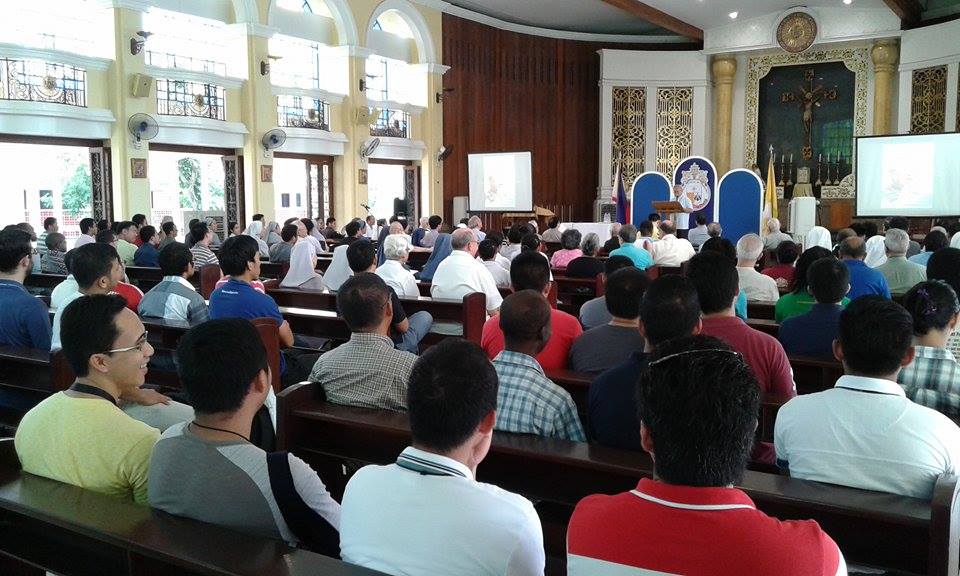
An Hour on Peace with Cardinal Quevedo
QUEZON CITY, Metro Manila — What has the Church got to do with the Peace Process in Mindanao?
Archbishop Orlando Cardinal Quevedo, OMI, DD of Cotabato shared his personal perspectives and experiences on the Peace Process in Mindanao to the people who attended the Loyola School of Theology (LST) Theological Hour on ‘The Church and the Search for Peace in Mindanao’ sponsored by San Jose Seminary today.
In his preliminary discussion, he outlined the factors that have put peace at risk, among which were what he called the dissonance of cultures particularly with the “Tri-People” (Christians, Muslims, and Lumads) of Mindanao, the historical and existential mind sets, prejudices, and biases, and the very strong economic disparity between groups. In a special note, Cardinal Quevedo added that the cause of conflict in Southern Mindanao has been the “Triple Injustice” done to Muslims since the Spanish occupation, i.e., against their identity and territory, sovereignty, and integral development.
HIS ROLE
Meanwhile, the Cardinal said that in the peace process, he has maintained a low profile role and a creative impartiality.
He said that he refused to be a member of any advisory panel, not even affixing his signature to any documents presented by groups who have also been advocating for peace. This, he thought, was the prudent thing to do lest the Muslims misinterpret such.
Nevertheless, in informal occasions, he was invited to negotiate ways to remove possible source of impasse. He has also urged a clear and explicit acknowledgment of the primacy of the Constitution.
FEARS OF NON-MUSLIMS
However, Christians, Lumads, and other ethnic groups within the Autonomous Region of Muslim Mindanao (ARMM) expressed their fears like being “sold down the river” when the Bangsamoro Basic Law (BBL) will have been approved and implemented. Some fear that they will lose their basic rights like the right to own lands and their right to religious freedom.
Such fears, the Cardinal added, are not without reasons since non-Muslims experienced some forms of harassment and threats from other Muslims who misunderstood the approbation of the law as “their time.”
THE ROLE OF THE CHURCH
Cardinal Quevedo maintained that the path of peace and harmony is dialogue. And here, he added, that the Church can engage noting that the Bishops’ Conferences of Asia always maintain that the proclamation of the Gospel is always through dialogue with other cultures in the region.
The Cardinal also enjoined those who attended to advance the cause of peace by knowing the facts and not cater to prejudices, by “evangelizing” people ridding them of biases, by forming social conscience regarding the BBL, by praying for wisdom for the legislative and Supreme Court, and by working for peace themselves, that is, by being vigilant regarding BBL implementation and by forming circles of solidarity for peace.
“I’M VERY OPTIMISTIC”
During the open forum, one participant asked the Cardinal whether the current conflicts in the Middle East perpetrated by the ISIS have some repercussions with the ongoing peace process in Mindanao with the possibility of recruitment of members from ARMM, which is the core territory of BBL, by radical violent fundamentalists. The Cardinal responded that when he asked the same question to both the government and MILF parties the answer was that there is no chance that ISIS can recruit.
The Cardinal said that he was “very optimistic with the BBL.”
TRUST
The Cardinal emphasized the importance of trust in any dialogue, not less with the peace negotiation entered into by the Philippine Government and MILF. He said that if there was no trust from both parties, it would have been very impossible for the peace process to continue and for the BBL to exist.
BUKAS PALAD AWARDEE
Yesterday, the Ateneo de Manila University bestowed to His Eminence Orlando Cardinal Quevedo, OMI, DD the Bukas-Palad Award for being a tireless peace builder among Christians and Muslims and for championing the rights of the poor and the marginalized regardless of their beliefs. (See http://www.admu.edu.ph/news/ateneo-honors-six-individuals-2014-special-academic-convocation)


No Comments